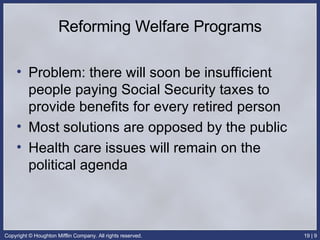Social welfare policy plays a significant role in the functioning of modern societies. It refers to the various measures and programs implemented by governments to provide financial and other assistance to individuals and families in need. This assistance can take the form of cash payments, food assistance, housing, healthcare, and other social services. The goal of social welfare policy is to promote the well-being of citizens by reducing poverty and inequality, improving the health and education of individuals and families, and providing a safety net for those who are unable to support themselves.
In the United States, social welfare policy is largely determined at the state and federal levels of government. At the federal level, the Department of Health and Human Services is responsible for administering many of the country's social welfare programs. These programs include Medicare, Medicaid, Temporary Assistance for Needy Families (TANF), and the Supplemental Nutrition Assistance Program (SNAP). In addition to these programs, the federal government also provides funding to states and localities to support a range of social welfare services, including child welfare, mental health services, and housing assistance.
State governments also play a significant role in the implementation of social welfare policy. Each state has its own set of social welfare programs, which are often funded in part by the federal government. These programs can vary widely from state to state, reflecting the unique needs and challenges of each state's population.
The development and implementation of social welfare policy is often a controversial and politically charged process. Proponents of social welfare programs argue that they are necessary to help those in need and promote the common good. Critics, on the other hand, argue that these programs discourage work and personal responsibility, and that they are often inefficient and prone to abuse.
In conclusion, social welfare policy plays a vital role in the well-being of modern societies. It provides a safety net for those who are unable to support themselves and helps to reduce poverty and inequality. While the development and implementation of social welfare policy can be controversial, it is an important aspect of government efforts to promote the well-being of citizens.







